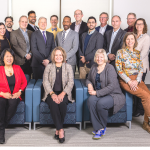Share
Table of contents
Don’t fore-get to purchase your ticket to the 92nd Annual North/South Doctors’ Golf Tournament!
Methadone for analgesia-ongoing support from current prescribers required
Dr. Marnie Hinton Award for Resident Physician Health
Dr. Bryan Ward Memorial Endowment Fund recipient, Dr. Justin Black
What happens when a rural medical clinic welcomes a steady stream of candidates for Practice-Ready Assessment (PRA-AB)?
Discover the positive experience shared by the assessors, candidates and allied health staff at Hanna Medical Clinic in this article from the Medical Council of Canada. Read more.
Don’t fore-get to purchase your ticket to the 92nd Annual North/South Doctors’ Golf Tournament!
Your contribution will make a difference in the life of a medical student, like Mohit!
 The Annual North/South Doctors’ Golf Tournament raises charitable dollars that directly fund medical student bursaries in Alberta. What kind of impact do these bursaries have on Alberta’s next generation of physicians? Mohit, a 2019 bursary recipient, shares his experience:
The Annual North/South Doctors’ Golf Tournament raises charitable dollars that directly fund medical student bursaries in Alberta. What kind of impact do these bursaries have on Alberta’s next generation of physicians? Mohit, a 2019 bursary recipient, shares his experience:
“My bursary helped me pay down my student loan debt. As you may know, medical students like me incur a tremendous financial burden funding our medical education, often without the ability to carry part-time employment due to the nature of our curriculum and workload. I have had many sleepless nights spent worrying about my financial future, given the cost of medical school and the cost of living. I am grateful for your contribution to this bursary and want you to know that you have truly made a positive difference in my life and my ability to pursue my dream of becoming a physician. Thank you!”
Mohit Kumar
Medical student (class of 2020)
University of Calgary
Would you like to help support Alberta’s next generation of physicians? Join your colleagues in June at the 92nd Annual North/South Doctors’ Golf Tournament by purchasing your tickets today!
When: Monday, June 17, 2019
Where: Red Deer Golf and Country Club
Please click here to purchase tickets or to make a monetary donation.
Methadone for analgesia-ongoing support from current prescribers required
April’s Messenger highlighted the discontinuation of the need for CPSA approval to prescribe methadone for pain. Physicians who provide methadone for analgesia (chronic pain or palliative conditions) are expected to acquire the relevant education and training.
It is strongly recommended that physicians who wish to provide methadone for analgesia complete the Canadian Virtual Hospice’s free, one-hour accredited online course on methadone for pain in palliative care. As well, physicians with limited experience regarding the use of methadone for analgesia are strongly encouraged to consult with an experienced colleague before starting a patient on methadone.
During the period when more community physicians acquire the knowledge and expertise to prescribe methadone for pain, support from experienced prescribers is expected, either through maintenance of prescribing while preparing for transition to community physicians, for consultation, or for bridging patients requiring methadone for pain when their prescriber is absent from practice and arrangements for part-fills have not been made.
As per the standard of practice on Prescribing: Drugs Associated with Substance Use Disorders or Substance Related Harm, the patient’s Netcare/PIN profile must be regularly reviewed for safe prescribing and communication with the patient’s other health professionals.
Questions? Send an email to CC.Inquiries@cpsa.ab.ca.
Discipline reports
CPSA Appeal Committee dismisses charges against Dr. Musbah Abouhamra
Charges of unprofessional conduct against Dr. Musbah Abouhamra were overturned by a Council Review Panel.
Background
In 2005, Dr. Abouhamra entered into an agreement with CPSA in which he was “restricted from performing invasive procedures in the office” due to equipment sterilization concerns. Subsequent monitoring by CPSA revealed that between April 1, 2015, and Dec. 3, 2016, Dr. Abouhamra performed invasive procedures on over 50 occasions.
At a CPSA Hearing Tribunal in June 2018, Dr. Abouhamra argued that he believed the condition on his practice permit applied only to his practice in Lloydminster, whereas the invasive procedures he performed were at a different clinic in Edmonton. The Hearing Tribunal negated his argument and found him guilty of unprofessional conduct.
Dr. Abouhamra appealed the decision and following a review, the Appeal Committee felt Dr. Abouhamra’s belief that he was not in violation of his practice restriction and had the proper permissions to perform invasive procedures at the new clinic was in fact reasonable. The Review Panel also agreed that the Hearing Tribunal erred in concluding that Dr. Abouhamra put the public at risk.
Commentary
A Council Appeal Committee is responsible for deciding whether a Hearing Tribunal decision was reasonable or not, rather than it being a case of right or wrong.
The Appeal Committee felt it was reasonable for the Hearing Tribunal to conclude that the scope of the agreement included all office settings that Dr. Abouhamra worked in. However, the Committee found it unreasonable to say that Dr. Abouhamra was “willfully blind” in his contradictory interpretation of the agreement. They noted that “willful blindness requires that Dr. Abouhamra knew or should have known that his interpretation was wrong and, according to the Hearing Tribunal, he breached it with intentional disregard.” The Appeal Committee felt that given the evidence and Dr. Abouhamra’s previous compliance with his practice restriction, that his interpretation was reasonable and genuine, even if incorrect.
Dr. David Odugbemi found guilty of unprofessional conduct
Edmonton family physician Dr. David Odugbemi was found guilty of unprofessional conduct by a CPSA Hearing Tribunal. The Tribunal ordered that Dr. Odugbemi’s practice permit be cancelled as of May 15, 2019, pending a decision by Dr. Odugbemi to appeal the matter, and that he pay 100 per cent of the costs of the investigation and hearing, totalling $66,544.18.
Background
In February 2015, Dr. Odugbemi entered into a Terms of Resolution Agreement (TORA) with CPSA, to resolve issues arising from a number of significant complaints about his medical practice. He failed to fulfill several aspects of the agreement, including:
- completion of a fitness-to-practice assessment;
- pursuit of further education;
- quality of charting improvement;
- quality of care improvement;
- compliance with restrictions on his practice permit; and
- payment of costs in a timely manner.
Commentary
The Hearing Tribunal concluded that Dr. Odugbemi signed the TORA with CPSA and subsequently demonstrated a pattern of ungovernable conduct, based on his repeated acts of non-compliance that harmed the integrity of the regulated profession.
CPSA and the public it is intended to protect must be able to rely on physicians to diligently follow through on agreements they make with the College. This is particularly critical in the case of agreements to resolve complaints and improve the quality of a physicians’ practice to an acceptable standard. The Tribunal felt that the failure of a physician to do so is serious and undermines the integrity of the medical profession in the eyes of the public.
Dr. Marnie Hinton Award for Resident Physician Health
Congratulations to Dr. Jeffrey McCarthy and Dr. Darby Ewashina, two innovative University of Calgary medical residents recognized earlier this year for their interest and work in physician health. Details of their work are included in the January 2019 issue of the University of Calgary’s PGMEpost.
Drs. McCarthy and Ewashina join University of Alberta resident Dr. Zafrina Poonja as the inaugural recipients of the annual Dr. Marnie Hinton Award for Resident Physician Health.
Dr. Marnie Hinton, a long-time Alberta physician, dedicated her life to physician health. For nearly 25 years, she worked with doctors struggling with addiction through the CPSA’s Physicians Aftercare Program, sharing her wisdom about healthy sobriety and even taking members to recovery meetings in her off hours. Jointly funded by the College of Physicians & Surgeons of Alberta and the Alberta Medical Association’s Physician and Family Support Program, the Dr. Marnie Hinton Award for Resident Physician Health is awarded annually to a medical resident with a demonstrated interest in physician health. Learn more about this award.
Professionalism in action
How a group of physicians came together to improve care for transgender Albertans
As a Medical Advisor for Alberta Health, I’ve had the opportunity to work directly with physicians from across the province, in a range of practice settings. There is certainly no shortage of pressing issues in our healthcare system and time and time again, I have seen Alberta physicians rise to meet those challenges and help fix them. But sometimes, you just have to stand back, take a deep breath and admire the superb professionalism demonstrated by our colleagues.
A recent example
Alberta Health funds a special program to support final-stage gender affirming surgery (“bottom surgery”) at a clinic in Montreal, for patients with gender dysphoria. This major surgery is not currently available in Alberta, which begs the question: how can one meet the complex perioperative needs of patients who travel out of province and then back to their own homes, without a surgical team in their home community? I’ve heard from innumerable family physicians, gynecologists, urologists, psychiatrists, plastic surgeons, patients and others, who all say there is a huge need for tools in Alberta to guide the care of transgender patients, along with a repository of contact information for local resources. This is especially important for family physicians who are the front-line care providers for transgender patients-and many of these physicians have very little experience or training in this area.
But with a huge unmet clinical need and limited budget, who would develop these clinical tools?
With encouragement from colleagues, Alberta Health approached Toward Optimized Practice (TOP), the premiere source of trusted practice information for family physicians in Alberta, to create a working group on transgender health care. The mandate of this group was to identify existing practice tools for transgender health care from other jurisdictions in Canada, adopt them for Alberta and publish them on TOP’s website.
Through networking and public calls for volunteers, six individuals joined the group: four family physicians, an endocrinologist and a psychiatrist. We quickly discovered that time was very tight for this busy group and scheduling meetings usually meant a 7 a.m. start time. The group met monthly by telephone for six months and undertook quite a bit of work individually between each meeting. Existing clinical tools were selected, re-drafted with Alberta-specific content, sent out for two separate waves of external reviews (from both inside the province and outside) and are now available online.
A common purpose
What was most remarkable about the entire process was the sense of selflessness and purpose from the many physicians who contributed. As chair of the group, I received a steady stream of emails from people who heard about what we were doing and wanted to know how they could help-we received a huge amount of assistance from this network of the willing.
Developing six tools to support transgender health care in Alberta is a good start and there is much more work yet to be done to support this vulnerable patient population. But after this project, I am left with a strong sense of what professionalism looks like in Alberta today: committed colleagues who are generous, quietly sharing their time, experience and problem-solving skills, to better meet the unmet needs of their patients.
Neil Hagen, MD FRCPC
Medical Advisor, Alberta Health
Opinion: axe the fax!
For decades, the fax machine was the gold standard of medical communication in Canada, but it is time for a change. There are countless stories of medical record privacy breaches from faxing due to human error and lack of secure encryption, leaving many healthcare professionals wondering when the healthcare community will adopt an easier, safer and more efficient way to share important patient information. In this opinion piece, Dr. Sandy J. Murray discusses some failures of the fax machine and explores alternate solutions for secure communication in our digital age. Read more.
























Comments for this post are now closed. If you would like to share your feedback on this topic, please email support@cpsa.ca.